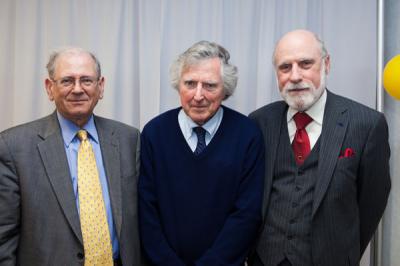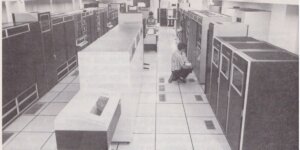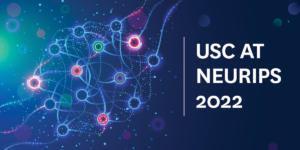
Internet pioneers Robert Kahn, Robert Braden, and Vinton G. Cerf at ISI ceremony
More than 50 computer pioneers and leaders key to the Internet’s ongoing development over the past 40 years gathered Friday, March 19 to recognize the contribution of the University of Southern California Information Sciences Institute in the hosting the Request for Comments (RFC) series.
For the past 32 years, the Information Sciences Institute (ISI) has served as the steward of the RFCs-the documents that both describe and shape the Internet’s inner workings.When the RFCs were born in 1969, the World Wide Web was more than 20 years short of a twinkle in Tim Berners-Lee’s eye. However, it is fitting that ISI is being recognized in Los Angeles for its role in helping to foster these documents.Three of the first four universities connected to what was then seen as highly advanced, but now as rudimentary, Internet in 1969 were located in California.
The event was held under the auspices of a coalition of Internet organizations, including the Internet Society, the Internet Engineering Task Force, the Internet Architecture Board, and the Internet Research Task Force.
Among those attending and speaking:
- Vint Cerf, widely recognized as one of the Internet’s “founding fathers”
- Stephen Crocker, author of the very first RFC
- Bob Kahn, widely recognized as one of the Internet’s “founding fathers”
- C.L. Max Nikias, Provost and President-designate of the University of Southern California
- Herbert Schorr, Executive Director of ISI and Senior Associate Dean of the Viterbi School of Engineering
- Russ Housley, Chair of the Internet Engineering Task Force
- Lynn St. Amour, President and CEO of the Internet Society
There are now more than 5,500 RFCs for such essential standards as email, file transfers, voice over the Internet, web transfers, and device addressing.
A detailed recent history “30 Years of RFCs,” is available at:
http://www.rfc-editor.org/rfc/rfc2555.txt
###
The Internet Society (ISOC) is a nonprofit organization founded in 1992 to provide leadership in Internet-related standards, education, and policy. ISOC is the organizational home of the Internet Engineering Task Force (IETF), the Internet’s premier technical standards body. With offices in Washington, D.C., and Geneva, Switzerland, it is dedicated to ensuring the open development, evolution, and use of the Internet for the benefit of people throughout the world. More information at http://InternetSociety.org
The Internet Engineering Task Force (IETF) is a large, international community of network designers, operators, vendors, and researchers concerned with the evolution of the Internet architecture and the smooth operation of the Internet. The mission of the IETF is make the Internet work better by producing high-quality, relevant technical documents that influence the way people design, use, and manage the Internet. It is open to any interested individuals. More information at http://www.ietf.org

From left: Herbert Schorr, Robert Kahn, Stephen Crocker, C.L. Max Nikias. (Chuck Espinoza photo)
The Internet Research Task Force works to promote research of importance to the evolution of the future Internet by creating focused, long-term and small Research Groups working on topics related to Internet protocols, applications, architecture and technology. More information at http://www.irtf.org/
The Internet Architecture Board is chartered both as a committee of the Internet Engineering Task Force (IETF) and as an advisory body of the Internet Society (ISOC). Its responsibilities include architectural oversight of IETF activities, Internet Standards Process oversight and appeal, and the appointment of the RFC Editor. The IAB is also responsible for the management of the IETF protocol parameter registries. More information at http://www.iab.org
The Information Sciences Institute specializes in research and development of advanced information processing, computer and communications technologies. A unit of the University of Southern California’s Viterbi School of Engineering, ISI is one of the nation’s largest university-affiliated computer research institutes. Its expertise spans a wide range computer science and engineering disciplines, bridging the gap between university investigation and real-world prototype development.
Published on March 19th, 2010
Last updated on August 5th, 2021












